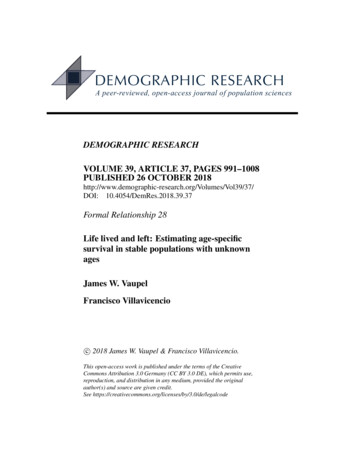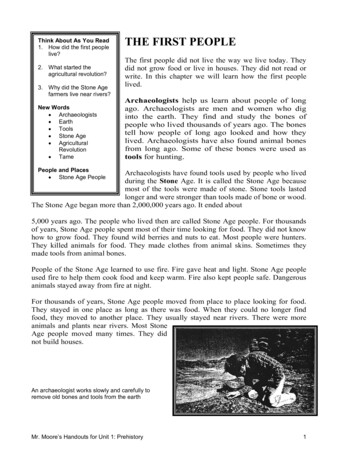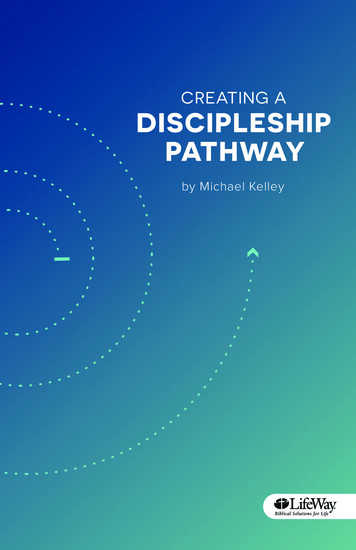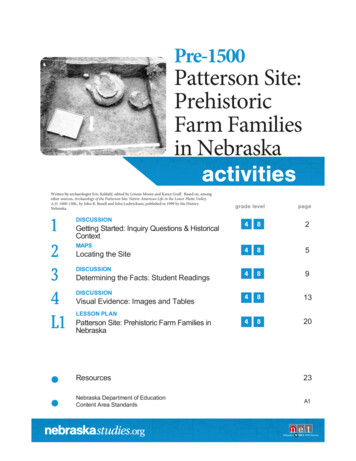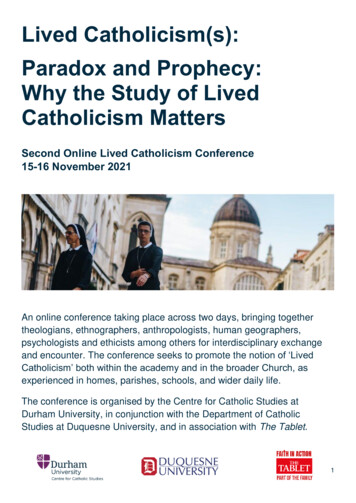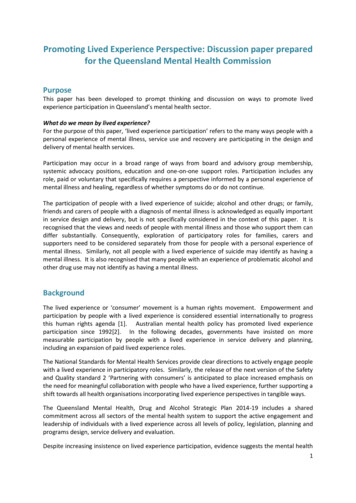
Transcription
Promoting Lived Experience Perspective: Discussion paper preparedfor the Queensland Mental Health CommissionPurposeThis paper has been developed to prompt thinking and discussion on ways to promote livedexperience participation in Queensland’s mental health sector.What do we mean by lived experience?For the purpose of this paper, ‘lived experience participation’ refers to the many ways people with apersonal experience of mental illness, service use and recovery are participating in the design anddelivery of mental health services.Participation may occur in a broad range of ways from board and advisory group membership,systemic advocacy positions, education and one-on-one support roles. Participation includes anyrole, paid or voluntary that specifically requires a perspective informed by a personal experience ofmental illness and healing, regardless of whether symptoms do or do not continue.The participation of people with a lived experience of suicide; alcohol and other drugs; or family,friends and carers of people with a diagnosis of mental illness is acknowledged as equally importantin service design and delivery, but is not specifically considered in the context of this paper. It isrecognised that the views and needs of people with mental illness and those who support them candiffer substantially. Consequently, exploration of participatory roles for families, carers andsupporters need to be considered separately from those for people with a personal experience ofmental illness. Similarly, not all people with a lived experience of suicide may identify as having amental illness. It is also recognised that many people with an experience of problematic alcohol andother drug use may not identify as having a mental illness.BackgroundThe lived experience or ‘consumer’ movement is a human rights movement. Empowerment andparticipation by people with a lived experience is considered essential internationally to progressthis human rights agenda [1]. Australian mental health policy has promoted lived experienceparticipation since 1992[2]. In the following decades, governments have insisted on moremeasurable participation by people with a lived experience in service delivery and planning,including an expansion of paid lived experience roles.The National Standards for Mental Health Services provide clear directions to actively engage peoplewith a lived experience in participatory roles. Similarly, the release of the next version of the Safetyand Quality standard 2 ‘Partnering with consumers’ is anticipated to place increased emphasis onthe need for meaningful collaboration with people who have a lived experience, further supporting ashift towards all health organisations incorporating lived experience perspectives in tangible ways.The Queensland Mental Health, Drug and Alcohol Strategic Plan 2014-19 includes a sharedcommitment across all sectors of the mental health system to support the active engagement andleadership of individuals with a lived experience across all levels of policy, legislation, planning andprograms design, service delivery and evaluation.Despite increasing insistence on lived experience participation, evidence suggests the mental health1
sector struggles to incorporate lived experience in meaningful ways [3].Here we review the growing international evidence that highlights the essential role of people with alived experience within the mental health sector, and the potential benefits of lived experienceparticipation to the mental health system. Possible future directions for promoting lived experiencein the mental health system are also identified.Benefits of Lived Experience participationLived experience knowledge is broader than an experience of illness and encompassesunderstanding of marginalisation, oppression and discrimination. Underpinning lived experienceperspectives include shared understanding of loss or changes to social status/inclusion;relationships; employment and concepts of self as a result of diagnosis and service use [4].Significantly, people with their own lived experience have also had periods of healing and wellness,regardless of whether they re-experience challenging times, and can provide practical advice onstrategies for recovery.Lived experience roles that embed the perspective of people with a lived experience in servicedelivery have been shown to improve outcomes for people using services in ways that can bemeasured from both clinical and recovery perspectives [5]. An emerging evidence base indicatessupport provided by people with a lived experience can be as effective in terms of symptomreduction and service satisfaction as care provided by mental health professionals [6]. Further,growing research suggests lived experience provides some benefits not found within traditionalservices [7]. People with their own lived experience do not have the same power imbalancescommonly found in service provider/service user relationships [8], and can actively challengeexisting power dynamics to promote the development of more equitable, collaborative therapeuticrelationships. People with a personal lived experience can empathise and advocate on behalf ofthose currently unable to do so. Lived experience roles have also been found to reduce coercionwithin services and increase the human rights of consumers [9].Research indicates lived experience provided services, particularly peer roles, contribute to animproved sense of hope, empowerment and social inclusion for those accessing services [10]. Socialinclusion and connectedness was found to include improved interpersonal relationships andcontribute to a sense of positive culture that fostered feelings of belonging and decreased socialisolation. Additionally, lived experience involvement increased social confidence and boosted selfesteem in obtaining employment. Simply meeting someone who has overcome similar experiencescan provide a living example of hope to those currently facing challenges [11]. Lived experienceroles not only provide hope, they understand its absolute importance. In the immortal words oflived experience pioneer Pat Deegan:For those of us who have been diagnosed with mental illness and who have lived inthe sometimes desolate wastelands of mental health programs and institutions,hope is not just a nice sounding euphemism. It is a matter of life and death [12].The cost of mental illness on the economy is enormous, with lost productivity in Australia estimatedat more than 10b p.a. and the overall direct cost of support for people with a mental illnessestimated at 28.6b p.a. [13]. Some studies have shown overall service expenditure can decrease asa result of lived experience involvement. There is growing evidence that employing people with alived experience in mental health inpatient settings may reduce the length of hospitalisation [14].Considering the high cost per day, per bed, this is potentially a significant cost saving.2
All these benefits potentially contribute to more positive recovery outcomes for people accessingservices.Guiding and leading the implementation of Recovery oriented practiceRecovery is a concept that has been developed and championed by people with a lived experience ofmental illness. Recovery concepts challenged the previous paradigm that insisted mental illness wasunremitting and chronic.Recovery focuses on enhancing the individual’s existing strengths rather than emphasising deficitsand works collaboratively with the individual, rather than prescribing an externally determined andmanaged course of treatment. Core recovery concepts include; Hope and belief that an individual may design a meaningful life of their own choosing,beyond the limitations of ‘illness’Empowerment, education and autonomy to ensure the needs of the individual are beingmet and they are enabled to guide their own healing journeyRespecting the role of spirituality – whatever that means for the individualAcknowledging and actively addressing the need for community, social inclusion andconnection with others.People with a lived experience have been promoting the concept of recovery for over 150 years andhave a deep internal and collective understanding of what recovery means and feels like. Since the1970s the lived experience movement has contributed significantly to the push towards a recoveryorientated mental health system.Since the early 1990s Australian Government policy mandated a move towards recovery orientatedservice delivery. However, recovery implementation is acknowledged to be emergent and in manyplaces lacking in effectiveness. Much of this could be attributed to confusion within the mentalhealth sector as to what recovery is and how it can be implemented meaningfully [15].In recent years lived experience roles aimed at supporting adoption of recovery oriented practice inmental health have increased. The validity of lived experience leadership in recovery education andimplementation is supported by both research and industry trends, demonstrated by theappointment of lived experience Deputy Mental Health Commissioners in NSW and nationally, aswell as executive level appointments to support recovery in a number of non-government andQueensland Health mental health services in Queensland.Existing and Future scope of Lived Experience participationLived experience roles in mental health careLived experience workforce development is occurring rapidly in the U.K., Canada, United States, NewZealand and Australia. Lived experience roles, particularly peer support workers, have flourishedwithin diverse settings in different countries. Peer support workers are employed in direct serviceroles to walk with others on their recovery journey: one-on-one or in groups. Until recently peerroles were predominantly found in the non-government sector.The federally funded Personal Helpers and Mentors (PHaMs) program guidelines stipulatesemployment of at least one peer support worker within each PHaMs service nationwide. More3
recently within the government sector, peer workers are being employed within Community CareUnits (CCU) to assist people as they transition from hospital back into the community.Although significant development has occurred, currently Australia has a less developed peerworkforce than some countries. In America, certified peer specialists are now available in selectedstates as a government subsidised service through Medicaid, a means-tested health programproviding affordable health care for low income families [11].Peer work in America is increasingly seen as an integral part of moving toward a recovery orientedsystem. The following quote demonstrates perceived value and comes from the executive directorof the American National Association of State Mental Health Program Directors, Robert Glover:Consumers and peers are invaluable to the future public mental health system. Notonly do they have a role to play, but they should be at the table in all aspects of oursystem [16].If Australia were to follow America’s lead, the ability for peers in Australia to become Medicareproviders could create great opportunity for community based lived experience support to becomemore available. The Better Access program in Australia already facilitates access to other types ofmental health care through Medicare.The wider expansion of peer roles in Australia’s mental health system has been advocated withinrecent national reports. The National Mental Health Commission’s review of mental healthprogrammes and services also identified increasing the peer support workforce as arecommendation for reform.Advocacy at a systemic, service and policy level has significantly increased the perceived value anduptake of peer work for NSW’s Flourish, who are now asking ‘why not a peer worker’ for every rolewithin the organisation. Flourish currently employ over 100 peer workers and are aiming for halftheir workforce as designated lived experience roles.The recent signing of the NDIS Bilateral Agreement for Queensland creates new potential for theuptake and expansion of peer roles. It is anticipated people with a mental illness who are eligible forthe NDIS will be able to access peer support as part of an individual package, as long as they areaware that peer support is an option. The Mental Health Council of Australia has pledged to assistcapacity building of the peer support workforce to assist access for NDIS participants. The NDISwebsite identifies the need to create additional support items to include mental health peer workersas a specific support for mental health participants, results of which are presently outstanding [17].Peer-run servicesPeer-run services have been at the forefront of promoting lived experience support roles in mentalhealth care. Nationally Queensland has provided some leadership in this area with three livedexperience/peer run services; BrookRED in BrisbanePEARL (managed by FSG Australia) on the Sunshine CoastPOS (Peer Operated Service) managed by Flourish in Hervey BayAlthough evidence relating to peer run services is sparse, the available research suggests livedexperience or peer run services provide significant benefits to lived experience employees includingongoing and appropriate supervision, training and support and less co-opting of lived experienceroles than is commonly found in mainstream services, where the peer role may be less understood[18].4
Lived experience advisory rolesLived experience or ‘consumer’ representation on forums, boards and advisory councils at local,state and national levels is common within the mental health sector. Lived experiencerepresentatives are often voting or deciding members of committees, forums or boards ofgovernment, non-government, industry or professional organisations. Lived experiencerepresentation aims to ensure the perspectives, priorities, interests and concerns of peopleaccessing services are presented and protected. Representative roles ensure accountability andtypically report back to the group they represent.Research and educationLived experience participation and leadership in research has been an identified target in the U.K. forsome time. Research has identified issues of importance to organisations/services and fundingbodies differ to those of people accessing mental health services [19]. Lived experience researchersensure the correct questions are being asked and the priorities of people accessing services arebeing addressed.Lived experience participation is increasing within higher education settings. In a recent survey of 32Australian Universities, 75% included some lived experience involvement in mental health nursingeducation. However the degree of involvement, particularly input into curriculum, was highlyvariable. While most lived experience involvement was sessional, there are a small but risingnumber of substantive lived experience academic positions in Australia, leading to greater livedexperience representation in both teaching and research.The University of Melbourne was the first to establish a lived experience academic role over adecade ago. This role still exists and research into this role has provided the impetus and for furtherdevelopment at other institutions.Recent research exploring a full-time lived experience academic role at CQUniversity in Queenslandrevealed overwhelmingly positive responses from participants, as the following quote illustrates:I can say hand on my heart that this has been the best course I've done. It haschanged me as a person and the [way] I approach every person. It had a profoundimpact [on me]. [20]As a result of these positive findings, the lived experience led course became a core or compulsorysubject with the undergraduate nursing degree. In time, due to the success of the role and highstudent numbers, a second fulltime lived experience academic and several casual roles have beendeveloped at CQUniversity. Curtin University in W.A. and the University of South Australia have alsoappointed part-time lived experience academic roles. Further, initiatives like the annualInternational Service Users in Academia Symposium and the NSW Consumer Led Research Networkaim to encourage and increase lived experience participation and leadership in academia.Despite these significant appointments and developments, academic roles are largely isolated, withfew lived experience academic positions within Australia or internationally. As research suggests,greater lived experience leadership in the formal education and workplace training of mental healthprofessionals would likely result in greater understanding of recovery principles by clinicians, lessstigmatising/discriminatory attitudes and subsequently, better outcomes for people accessingservices.Challenging Stigma/Discrimination5
Many studies have reported the important role of people with a lived experience in challengingstigma/discrimination [21]. The act of being ‘out and proud’ has been found to challenge the notionthat there is something fundamentally ‘wrong with’ or ‘different’ about people facing mental healthissues. The visibility of people with a lived experience also challenges the code of silence thattypically surrounds mental health issues and lets others facing mental health issues know they arenot alone.Because of discriminatory attitudes still attached to mental health issues, many people do not talk totheir usual support networks and delay seeking professional help. This leads to isolation and mentalhealth issues becoming significantly worse by the time any assistance is sought [22]. Wide scale useof people with a lived experience being ‘out and proud’ could contribute to a dramatic change insocietal attitudes towards mental health issues, potentially leading to less isolation, lower suiciderates and lower incidence of severe or persistent mental illness.The ‘Coming Out Proud’ program supports people to make informed decisions about their readinessto come out with mental health challenges. This program is based on decades of research,facilitated by people with a lived experience, and provides a whole-of-community focus bypotentially empowering many people within a range of communities to have the courage to speakabout their experiences [21].Rural, Remote and Regional SettingsProviding appropriate mental health care to meet the needs of people in rural, remote and regionalareas continues to be a challenge. It is particularly difficult to attract and retain professionallytrained staff to rural and regional areas [23].Currently few lived experience roles exist in rural and regional settings. Those that do exist showpromising results. The ‘Peer Perspectives Program’ run by Uniting Care in South Burnett providespeer support to people in drought affected areas and has received positive feedback from thosewho’ve accessed it.While the development of lived experience roles in rural, remote and regional areas would notreplace the need for mental health professionals, an increase in lived experience roles may have thepotential to make a positive difference in these areas [24]. People with a lived experience recruitedlocally, are committed to the area and understand the unique perspectives, culture and challengesof rural life. Initiatives like the successful ‘Men’s Shed’ also demonstrate that men are more likely toopen up about health and mental health issues in less formal, peer support settings.Beyond Mental Health SettingsThere is evidence to indicate the value in exploring lived experience roles beyond mental healthsettings, to consider education and liaison roles within emergency services, housing, employmentand primary and secondary schooling. In one of the more innovative examples, people with a livedexperience were employed to assist people with mental health challenges to re-enter the workforce.Within this project, people already working in peer roles were taught the core competencies of asupported employment model.Despite ongoing training, the peers had no specialised education or background in the area ofemployment support. The peers were also performing in their substantive roles whilst fulfilling therole of employment specialist, creating a very high workload. Despite these barriers, research foundthe peers performed at average or above average levels, which was considered encouraging. Thefindings also indicated participants saw the peers as role models and this helping participants over6
come self-stigma, consequently improving their confidence in finding and retaining employment[25].As an early-intervention and long range prevention strategy, people with a lived experienceproviding education to primary and secondary students could encourage more open conversationabout mental health. This could help to normalise mental health challenges, encourage moresupport within existing networks and potentially decrease the number of people seeking serviceprovision.It is possible that wide scale recovery education led by people with a lived experience could alsoempower friends, families and communities to better understand and support people with mentalhealth challenges. Better understanding and support within communities, particularly aroundconcepts of hope and belief, could also contribute to more people receiving support earlier,eventually taking some of the onus off service providers and ultimately reducing the incidence ofacute mental illness.Barriers and EnablersDespite the many benefits of lived experience participation, barriers to development are identifiedthroughout the literature. Supportive factors that assist or enable are also identified.Credibility and professional isolationLack of credibility in the eyes of mental health professionals has contributed to common experiencesof professional isolation, marginalisation and tokenism particularly within traditional services [26]. Aclearer role for lived experience workers in the leadership of recovery implementation has been onerecommendation to address this issue [27].Wide scale training on the value of lived experience roles has also been suggested to lessen thestigma/discrimination frequently faced by lived experience workers [28]. Similarly, increasing thenumbers of lived experience workers within an organisation and ensuring access to lived experiencenetworks and supervision has been proposed to counteract issues of isolation and discrimination.Organisational environmentResearch indicates senior manager attitudes as critical to the success of lived experienceparticipation [29]. Several studies cited commitment to lived experience participation in the form oforganisational leadership as the most essential ingredient in the successful inclusion of livedexperience roles. The attitudes of senior managers were found to influence the wider workplaceculture, aiding collaboration and inclusion of lived experience roles within the workplace [29].Supportive or enabling factors were identified when the organisation was truly willing toaccommodate the lived experience worker and had a willingness to make structural and proceduralchanges [6]. In best practice examples, services utilised the lived experience roles to intentionallywork towards change, particularly better recovery uptake and better responsiveness to service userneeds.Reasonable accommodationsOrganisations that were inclusive of lived experience frequently offer ‘reasonable accommodations’which allow some flexibility in the roles. The degree of formality with these arrangements and whatthe flexibility looks like depends on the service and type of role but may include the ability to workfrom home, or have reduced hours when needed that can be caught up later [30]. Having thisflexibility aids the sustainability and success of the roles. Organisations adopting these practices7
commonly began by considering flexibility for lived experience specifically but often extend thebenefit to all employees, contributing to more inclusive workplace culture.Workforce developmentAn inconsistent approach to workforce development has been identified as a potential barrier to thepromotion of lived experience roles in Australia. There is a need to address issues of remuneration,career pathways, articulated position descriptions and access to appropriate supervision. A lack ofidentifiable national leadership and divergent ideas within the lived experience movement aboutworkforce development has also been cited as potential barriers in a number of studies.The role of professional education and training for lived experience roles has been a source ofsignificant disagreement within the lived experience movement. There are particular concerns aboutpeer workers being ‘co-opted’ or forced into mimicking traditional mental health roles [31]. There isalso concern that training requirements for peer positions could act as a barrier to people being ableto enter lived experience roles.Accredited training has been seen as potentially increasing the acceptance of the roles, chiefly byacademically trained mental health colleagues. However, concerns have been raised thataccreditation could undermine or diminish the ways of knowing and viewing that make livedexperience work unique [32].Specialised training developed by people with a lived experience is seen as a positive way of avoidingco-opting [31]. The nationally accredited Cert IV in Mental Health Peer Work has sought to addressthis concern by having core content designed and delivered by people with a lived experience.An example of lived experience devised and developed training is Intentional Peer Support (IPS) whichis one of the few lived experience courses available internationally. IPS has recently been listed as atraining recommendation for peer workers within the Queensland Government’s CCU (community careunit) model of service and includes a focus on: Hope as a core perspectiveMutual responsibility within the relationship, with both people ultimately being transformed bythe relationship rather than the traditional ‘helper’ relationship commonly found in servicesMoving towards what is wanted rather than away from what is not wantedAcknowledgment of different world views and working intentionally towards a shared worldview and ability to communicate and connect more effectively [4]A variety of other peer support approaches with similar underpinning principles have developed acrossdiverse settings. Many services use a mix of peer devised tools and approaches, adapting and adoptingto best suit the needs of the individual context. Reports indicate the effectiveness of this strategy islargely dependent on whether the choices and adaptions are made to serve organisational goals andmaintain pre-existing service priorities, or are focused on best outcomes for the person accessingthe service.Placement of peers in less traditional settings, with the willingness or flexibility to be inclusive oflived experience priorities, has been raised to ensure co-opting of peer staff is minimised or avoided[18]. One suggestion proposes ‘housing’ peers within peer-run settings and working within moretraditional services a few days a week to provide a primary work environment that understands andsupports the roles as well as access to appropriate networks and supervision.The great diversity of lived experience roles encompassing one-on-one or group peer interactions;systemic advocacy; committee, forum and board representation; education and research as well as8
the complexity of these positions, suggest the need for a diverse range of lived experienceprofessional development activity to meet different roles and settings.Increasing the Evidence BaseAlthough an emergent evidence base exists, more robust research is needed to demonstrate thevalue and embed lived experience roles within the mental health sector, particularly to increase thecredibility and acceptance of lived experience participation. It is critical that research into livedexperience participation includes lived experience leadership in the research design, process andreporting [33].Co-production and Lived Experience LeadershipCo-production with allies from other disciplines is critical to the success of lived experience roles.However, research cautions that co-production must ensure lived experience voices have equalweighting and be enabled to lead in areas that are appropriate – particularly regarding recoveryorientated concepts and the needs and priorities of people accessing services [27]. Lived experienceparticipation at all levels of the system, including executive management roles is increasing acrossthe sector and is believed to be essential to allow lived experience perspectives authority andimpact. The need for leadership has been highlighted by the pending development of a LivedExperience Leadership Academy based at Yale University, America.AcknowledgementThis paper has been prepared for the Queensland Mental Health Commission by Dr Louise Byrne,Lecturer in Lived Experience Mental Health, CQ University Australia.Selected ReferencesA complete list of references including international review of literature is available on request1.2.3.4.5.6.7.8.9.World Health Organization, User empowerment in mental health: A statement by the WHOregional office for Europe. 2010, World Health Organization: Copenhagen: Denmark.Australian Health Ministers, National mental health plan. 1992, Commonwealth of Australia:Canberra.Happell, B., et al., Consumer participation in nurse education: A national survey of Australianuniversities. International Journal of Mental Health Nursing, 2015.Mead, S. and C. MacNeil, Peer support: What makes it unique? International Journal ofPsychosocial Rehabilitation, 2006. 10(2): p. 29-37.Resnick, S.G. and R.A. Rosenheck, Integrating peer-provided services: A quasi-experimentalstudy of recovery orientation, confidence, and empowerment. Psychiatric Services, 2008.59(11): p. 1307-1314.Davies, K., M. Gray, and L. Butcher, Lean on me: The potential for peer s
This paper has been developed to prompt thinking and discussion on ways to promote lived experience participation in Queensland's mental health sector. What do we mean by lived experience? or the purpose of this paper, 'lived experience participation' refers to the many ways people with a

